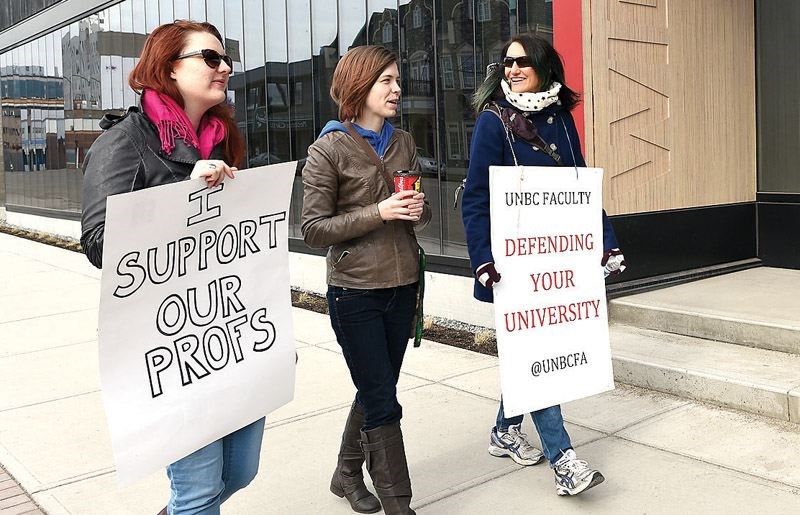Binding arbitration - when it comes to the University of Northern B.C. and its faculty - will set a new precedent when it comes to first collective agreements in B.C.
"Writing a first collective agreement under a certificate from the labour board hasn't happened in this province," said Mark Thompson, a professor emeritus with UBC's Sauder School of Business who specializes in industry relations. "UNBC will be an example of what can happen good or bad.
"I think UNBC may be kind of a pioneer in this or a leader in this second round of certifications and bargaining in the province, so if I were Simon Fraser and (University of Victoria) I'd be watching UNBC carefully," said Thompson in reference to faculty that also moved to unionize last year, something he said speaks to the current education climate.
"There's clearly some dissatisfaction... with the way they've been treated under the existing system."
The two sides have yet to agree on an arbitrator more than two weeks after the Labour Relations Board's mediator ordered binding arbitration. The LRB mediator was called in by the university through a process only permitted for first collective agreements, and made the recommendation after meeting for one day.
"The stakes are high for arbitration," Thompson said. "If either side gets stuck with something they really don't like it could be a long time getting rid of it."
Jacqueline Holler, UNBC Faculty Association president, said there's nothing new to report but that an update should come by Monday.
Both sides have have been working towards choosing an arbitrator, said Rob van Adrichem, UNBC's vice president of external relations.
"It is not yet known who the arbitrator will be or what the time frame will be for the arbitration process - both in terms of when it will begin or how long it might last."
The arbitrator will make a decision on the remaining 13 articles, eight of which deal with compensation.
That's a lot of items to get through, said Thompson, but not unusual for a first agreement.
Compensation has kept them far apart. The faculty has asked for a re-mapping of its salary structure, pointing to a 20 per cent salary disparity with comparable institutions.
The university acknowledged the gap, but said it must comply with the province's economic mandate and offered a five year deal totaling 5.5 per cent. It later added "Enhanced Career Development" increments to close the gap for some, dependent on peer review and a merit-based approach the faculty criticized.
But mediator Vince Ready said in his February 2014 report that he is not convinced the university must comply with the province's mandate, citing a 2013 agreement at the University of B.C. that didn't comply.
"Given the lack of collective agreement direction in the instant case, I consider myself even less restricted by the (Public Sector Employers Council) mandate," Ready wrote.
In that case, the arbitrator only went slightly above the mandate, said Thompson.
"The government didn't challenge it. They do not have a legislative mandate: there's no law behind those mandates so what were they going to do? All they have is the power of the purse," said Thompson, noting UBC has binding arbitration as its default last resort so a strike is never an option in negotiations.
"Here if they say it would be three or four per cent above the mandate, that might cause problems," said Thompson, who agreed a case could be made that the provincial mandate only applies to existing agreements, which UNBC doesn't have.
"My first reaction is that if you're trying to restructure the salary, the compensation system (5.5) per cent over five years doesn't give you any room to do that really."
On Thursday the province sent a press release lauding collective agreements passed under the 2014 directive.
"The government's Economic Stability Mandate gives public-sector employers the ability to negotiate longer-term agreements within a fixed fiscal envelope," it said, pointing to recent tentative agreements between Vancouver Community College and Langara College. "Settlements are expected to be unique and to reflect priorities negotiated to ensure labour stability and affordable service delivery throughout B.C."
UNBC has said it doesn't have the money, which Thompson said is a familiar refrain with these types of negotiations. If true, the university would have to resort to creative measures to comply with an unfavourable arbitrator's decision.
"Maybe they start laying off and cutting programs and that might generate enough political support that the provincial government would find a way to give money without appearing to do so."
Whether things are wrapped up in weeks or months, UNBC will have to settle on its budget to present to the Board of Governors on May 30.
When the two parties get back to the table, it will likely be with an arbitrator familiar to their situation, Thompson said.
"It would be several days of hearings and then the arbitrator need some time to write a decision," said Thompson, adding the timeline depends on the arbitrator's availability, some of whom are in high demand.
"It's a kind of quasi-judicial proceeding. The parties bring in briefs and they may bring in accountants, experts of one kind or another and they make their case.
"My observation about universities bargaining is that everything takes longer," he said. "They are trained to be thorough on how they express things and so forth and those are all good qualities but they don't make for a fast resolution."



